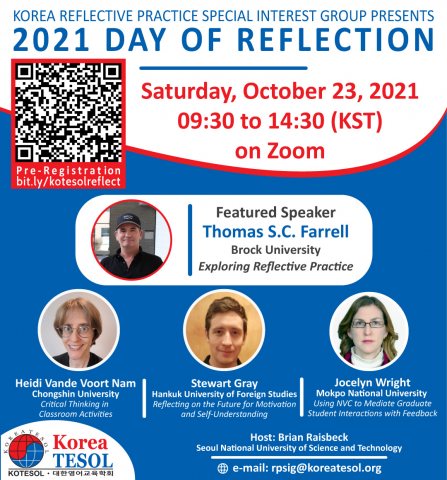
The Korea Reflective Practice Special Interest Group will be hosting its first ever online “Day of Reflection” on Saturday, October 23. This biennial event will give participants the opportunity to reflect on the past year and help them approach their teaching practice with more intent and purpose through a series of workshops and presentations. Pre-registration information, full schedule, and abstracts are below. Event is free and open to all who register.
Pre-registration: https://bit.ly/kotesolreflect
Thomas S.C. Farrell
Exploring Reflective Practice (09:30-10:20)
Brock University
Gaining teaching experience as a teacher is not enough to provide automatic professional development, for we do not learn much from experience as much as we learn from reflecting on that experience. Reflective practice involves instructors systematically looking at what they do, how they do it, why they do it, what the outcomes are in terms of student learning, and what actions they will take as a result of knowing all of this information. Thus, experience combined with systematic reflection can lead to professional growth so that we can become more effective teachers. In this plenary I discuss what reflective practice is, how it can be accomplished and conclude with four key principles of reflective practice for language teachers.
Thomas S.C. Farrell is Professor of Applied Linguistics at Brock University, Canada. Professor Farrell’s professional interests include Reflective Practice, and Language Teacher Education & Development. Professor Farrell has published widely in academic journals and has presented at major conferences worldwide on these topics. A selection of his work can be found on his webpage: www.reflectiveinquiry.ca
Heidi Vande Voort Nam
Critical Thinking in Classroom Activities (10:30-11:20)
Chongshin University
“Critical thinking” tops the list of 21st-century skills, but what types of thinking are “critical” and how do you incorporate them into classroom activities? While critical thinking can be defined in different ways, it generally involves the objective evaluation of ideas in order to make a judgment or choose a course of action. In this workshop, participants will identify sub-skills of critical thinking and distinguish critical thinking from other types of thinking that might happen in a language class. Four classroom activities will be presented, and participants comment on the strengths and weaknesses of each activity as a vehicle for practicing critical thinking. They will also be invited to share critical thinking activities that they have used in class as well as ideas that teachers can use for improving their own critical thinking skills.
Heidi Vande Voort Nam (MA TESL/TEFL University of Birmingham) teaches a mix of general English and English teacher-training courses at Chongshin University in Seoul. Heidi wears a number of hats within KOTESOL. She is currently serving as human resources director for the 2021 KOTESOL Film Festival and National Conference. As co-facilitator of KOTESOL’s Christian Teachers SIG, she puts together activities for Christian teachers. When she wears her KOTESOL Facebook group administrator hat, she aims to promote productive discussion about English language teaching in social media.
Lunch Break (11:30-12:30)
Stewart Gray
Reflecting on the Future for Motivation and Self-Understanding (12:30-13:20)
Hankuk University of Foreign Studies
Reflection is a powerful tool for turning experience into improved self-understanding. Naturally, we can reflect on our experiences past and present. However, the focus of this session is reflecting on future experiences, on what we will do, and on who we will be.
It may seem counterintuitive to suggest reflecting on experiences we have not had yet, but our behaviour now is shaped by a sense of who we wish to become. We strive to make our desired future a reality with our present actions. Thus, reflection on the future we are hoping for can give us an understanding of ourselves. Moreover, this reflection can be motivating, as it can give us a clearer sense of how to get where we want to go.
In this session, I will outline some of the theory relating to possible future identities, and some ways that learners and teachers can make use of this theory. I will then take participants through a practical future reflection activity that can be used for personal reflection or in class with students.
Stewart Gray teaches English at Hankuk University of Foreign Studies, South Korea. He recently completed his PhD in Education at the University of Leeds, UK. His academic interests include reflective teaching practice, language learning motivation and identity, creativity in EFL classes, and critical pedagogies.
Jocelyn Wright
Using NVC to Mediate Graduate Student Interactions with Feedback (13:30 - 14:20)
Mokpo National University
Writing a graduate thesis or dissertation requires a considerable amount of time, persistent effort, and resilience. As such, it can be an emotional as well as a cognitively charged experience. Simultaneously dealing with written feedback from multiple committee members leading up to a defense can be especially stressful. However, supervisor-mediated reflective practice can be constructive in dealing with this input. In this presentation of a case study that looks at discourse from a Nonviolent Communication (NVC) perspective, I discuss how student-generated feedback response forms and mediation helped a graduate student competently navigate certain issues and finally gain admission into the community of scholars.
Jocelyn Wright, Associate Professor in the Department of English Language and Literature at Mokpo National University, has been actively involved in KOTESOL as a regional coordinator of the Reflective Practice Special Interest Group (SIG) and national coordinator of the Social Justice (Critical Educators in Korea) SIG. She is very interested in the areas of Nonviolent Communication and Peace Linguistics.
Brian Raisbeck
Korea RPSIG Day of Reflection Host
Seoul National University of Science and Technology
Brian Raisbeck has taught EFL in Korea for over a decade. He holds an MAT in TESOL from the University of Southern California and an MSc in Applied Linguistics and Second Language Acquisition from the University of Oxford. He is also the National Facilitator of the Reflective Practice Special Interest Group (RPSIG) and the Facilitator of the RPSIG’s Seoul group.


